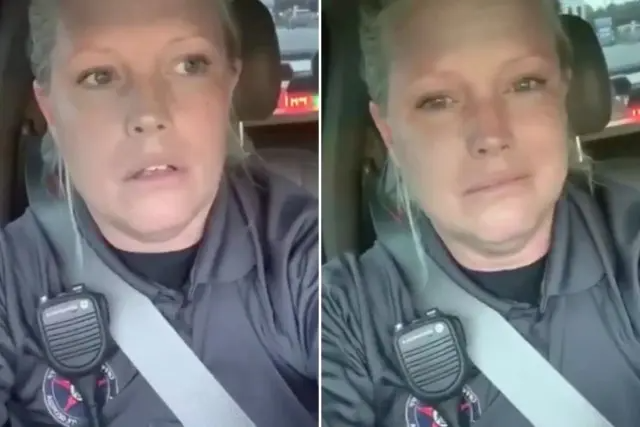Karens
Officer Karen’s The Viral Mcdonald’s Incident: Officer Stacey’s Emotional Breakdown

Officer Karen’s: Officer Stacey, a 15-year Georgia police veteran, broke down in tears at a McDonald’s drive-thru in a viral video. The dramatic incident began when Stacey’s mobile order for a McMuffin, hashbrowns, and coffee at a Richmond Hill McDonald’s outside Savannah was delayed. The Twitter video showed Stacey’s rage and disappointment as she recounted the event.
Credit : Stacy Talbert via Storyful / GlobalNews
Despite the long drive-thru wait, Stacey was unhappy when she said her order was unfinished. The scene deteriorated when a staffer gave her merely coffee and told her to “pull up” since her dinner wasn’t ready. Too frightened to accept the unfinished order, Stacey declined the dish, citing her uneasiness over not seeing it prepared.
The event highlighted law enforcement personnel’s everyday struggles and started a discourse about public attitudes toward police. Some viewers appreciated Stacey’s call for empathy, while others criticized her attitude on social media, coining the name “Officer Karen.”
Officer Karen’s Social Media Backlash
On social media, “Officer Karen” refers to police officers who complain about little issues. After Officer Stacey’s McDonald’s treatment video went viral, many were outraged, and others called her “Officer Karen.”
Supporters say Stacey’s emotional reaction shows police officers’ stress and anxiety, particularly in light of recent police brutality allegations. They stress empathy and understanding, emphasizing the profession’s difficulty. However, opponents say cops should be able to manage high-pressure circumstances, and Stacey’s response to a delayed McMuffin was excessive.
The event shows how difficult it is for law officers to maintain a favorable public image in an age when social media can swiftly magnify isolated instances and create viral names like “Officer Karen.”
Placing Officer Stacey’s Experience In Society
Social and political problems surround Officer Stacey’s McDonald’s meltdown. The video was released after the killing of George Floyd amid demonstrations against systematic racism and police violence.
Stacey’s story was compared to the Atlanta shooting of unarmed black man Rayshard Brooks on social media. Critics said Stacey’s upset about a delayed breakfast looked inconsistent with fatal instances and raised questions about the public’s expectations of police enforcement.
New York City police unions accused Shake Shack workers of poisoning three cops with poisoned milkshakes. However, the accusation was eventually disproven. These instances compound Officer Stacey’s viral McDonald’s experience by highlighting police officers’ struggles to build public trust and navigate public views.
Social Media Reaction: Divided
Officer Stacey’s McDonald’s incident went viral, sparking social media outrage. Twitter users commented on the video, which has over 3 million views. Law enforcement supporters defended Stacey, citing police’ everyday struggles. They said the event showed the need for empathy for public safety workers.
A large chunk of the internet community slammed Stacey’s emotional reaction, calling her “Officer Karen” to compare her to complainers. This designation started a conversation about society’s expectations of law enforcement and how police behavior discourse affects them.
Law enforcement topics are polarized, as seen by social media replies. It also raises issues about how internet platforms shape public image and the problems officers confront when viral material can magnify every action.
Read Also: “Zombie Karen” Chronicles: Viral Of Chaos
Officer Stacey’s Plea: Police Pr Impact
Officer Stacey’s passionate request for empathy and a “break” for law enforcement underscores a more considerable worry about police-community relations. The film shows the emotional toll of frequent public scrutiny on police, even in relatively ordinary events like a breakfast order delay.
The event occurred as police agencies struggled countrywide to regain public confidence and reputation. Stacey’s vulnerability in the film humanizes the badge and highlights cops’ public opinion issues. How can law enforcement agencies improve understanding and collaboration by bridging officers’ personal experiences with public expectations?
Some say events like this allow for empathy and discourse, while others say cops should be held to a higher standard given their duties. Officer Stacey’s social media appeal sparked a discussion regarding law enforcement-community relations.
Broader Law Enforcement Implications
Officer Stacey’s McDonald’s incident is a microcosm of law enforcement’s complicated issues today. Critics say the event shows a misdirected focus on a delayed breakfast order rather than systemic police problems like racial profiling and excessive force.
The incident follows New York City police unions’ dubious claims of cops being poisoned at Shake Shack. This episode casts doubt on law enforcement assertions and emphasizes the need for fact-checking and context.
As conversations over Officer Stacey’s McDonald’s experience continue, the event highlights law enforcement’s struggles to preserve public confidence, navigate cultural expectations, and confront systemic criminal justice concerns. It makes people question the narratives that drive public perception and police action in today’s complicated social milieu.













You must be logged in to post a comment Login